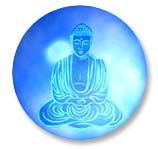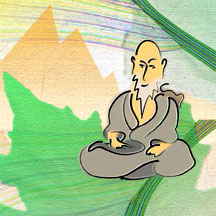On The Way: The Daily Zen Journal
Essence of Perception
The Buddha said: “As you see me now, the essence of your seeing is originally clear. Although it is not the profound Bright Mind, it is like a second moon but is not a reflection of the moon in water. Now listen attentively to my explanation of that which cannot return anywhere.
“Ananda, the doors and windows of this hall are wide open and face east. There is light when the sun rises in the sky, and there is darkness at midnight when the moon wanes or is hidden by fog or clouds. Your seeing is unimpeded through open doors and windows but is obstructed where there are walls or houses.
“Where there is discrimination, you perceive the stirring causes, and in the dull void you only see emptiness. An unconscious condition results from confused externals whereas an awakened state leads to clear perception.
“You should know that the essential Bodhi is wondrous and bright, being neither cause nor condition, neither self as such nor not self as such, neither unreality nor not unreality, for it is beyond all forms and is identical with all things.
“How can you now think of it and use frivolous terminology of the world to express it? This is like trying to catch or touch the void with your hand; you will only tire yourself, for how can you catch the void?
“Ananda, consciousness has no origin and is an illusion arising from the six organs and sense data. Look at this assembly and turn round to see those present; your eyes are like a mirror which cannot discern while your consciousness notices in turn the presences of Manjushri, Subhuti, Sariputra and the others.
“Does this consciousness come from perception, form, or the void, or does it emerge suddenly without any cause? Because your mind is unsettled, you do not realize that the seeing and hearing that arouse consciousness, come fundamentally from the Tathagata store. You do not realize that consciousness is the enlightened basic Bodhi. It embraces and pervades the whole Dharma-realm and is not found in a given place or direction manifesting according to the laws of karma.
“Ignorant worldlings think wrongly that it is causal, conditional and due to the self as such, according to the way their consciousnesses differentiate and discriminate while they do not know that the language they use has no real meaning.”

After listening to the Buddha’s profound instruction, Ananda and the assembly realized that their bodies and minds were now free from all obstructions. Each understood that self mind pervades the ten directions of space, this clearly seen like a leaf held in the hand.
All things were seen as the wondrous and bright fundamental Mind of Bodhi. While this essence of Mind embraced all and contained the ten directions, Ananda looked back at his own body given him by his parents, and beheld it like a speck of dust dancing in the great void sometimes visible and sometimes not, like a bubble rising and falling aimlessly in a boundless clear ocean.
“After seeing all this clearly, they all realized their fundamental, profound, permanent and indestructible self-minds, and brought their palms together to offer thanks for being shown what they had never seen before.
The Surangama Sutra
Excerpted from The Surangama Sutra -Translated by Upasaka Lu K’uan Yu (Charles Luk) 1966




The Surangama Sutra was predicted to be the first sutra to disappear in the “Dharma ending age.” In this work the Buddha begins by revealing Ananda's attachment to his illusions and then reveals to him the teaching of the One Mind. Many of the parables from the sutra are recognizable to us and certainly have managed to stay alive in our times.
“You are still clinging to your mind to listen to the Dharma; you fail to realize the Dharma nature. This is like a man pointing a finger at the moon to show it to others who should follow the direction of the finger to look at the moon. If they look at the finger and mistake it for the moon, they lose sight of both the moon and the finger. Why? Because the bright moon is actually pointed at; they mistake the finger for the bright moon and are not clear about brightness and darkness.”
While many of the sutras seem quite intellectual and vast in scope, the Surangama Sutra is still a primary source for many schools of Zen.
Studying Roots and Branches,
Elana, Scribe for Daily Zen